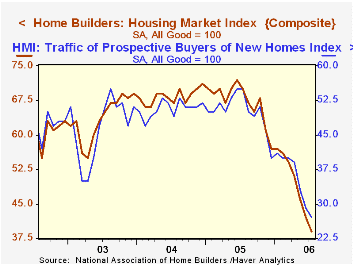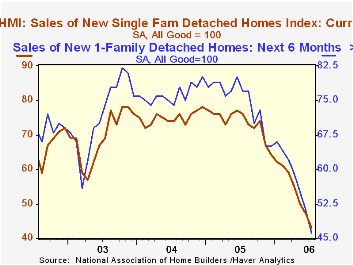 Global| Jul 19 2006
Global| Jul 19 2006NAHB Housing Market Index Lowest Since 1991
by:Tom Moeller
|in:Economy in Brief
Summary
The July Composite Housing Market Index at 39 was at its lowest level since late 1991. The index compiled by the National Association of Home Builders (NAHB) fell from 42 in June and compared to Consensus expectations for a reading of [...]

The July Composite Housing Market Index at 39 was at its lowest level since late 1991. The index compiled by the National Association of Home Builders (NAHB) fell from 42 in June and compared to Consensus expectations for a reading of 41.
During the last twenty years there has been a 75% correlation between the y/y change in the Composite Index and the change in single family housing starts.
The sub indexes covering current sales of single family homes (-43.4% y/y) and sales in the next six months (-40.3% y/y) were both down sharply m/m.
An index of the traffic of prospective home buyers fell even further from a dried up June level and was down 50.9% y/y.
Housing markets around the country were weak in July. The index for the Northeast off 47.8% y/y, in the Midwest the index fell 56.3% y/y, out West it was down 42.0% y/y and in the South it fell 32.4% y/y.
The NAHB index is a diffusion index based on a survey of builders. Readings above 50 signal that more builders view conditions as good than poor.
Visit the National Association of Home Builders.
| Nat'l Association of Home Builders | July | June | July '05 | 2005 | 2004 | 2003 |
|---|---|---|---|---|---|---|
| Composite Housing Market Index | 39 | 42 | 70 | 67 | 68 | 64 |
Tom Moeller
AuthorMore in Author Profile »Prior to joining Haver Analytics in 2000, Mr. Moeller worked as the Economist at Chancellor Capital Management from 1985 to 1999. There, he developed comprehensive economic forecasts and interpreted economic data for equity and fixed income portfolio managers. Also at Chancellor, Mr. Moeller worked as an equity analyst and was responsible for researching and rating companies in the economically sensitive automobile and housing industries for investment in Chancellor’s equity portfolio. Prior to joining Chancellor, Mr. Moeller was an Economist at Citibank from 1979 to 1984. He also analyzed pricing behavior in the metals industry for the Council on Wage and Price Stability in Washington, D.C. In 1999, Mr. Moeller received the award for most accurate forecast from the Forecasters' Club of New York. From 1990 to 1992 he was President of the New York Association for Business Economists. Mr. Moeller earned an M.B.A. in Finance from Fordham University, where he graduated in 1987. He holds a Bachelor of Arts in Economics from George Washington University.
More Economy in Brief
 Global| Feb 05 2026
Global| Feb 05 2026Charts of the Week: Balanced Policy, Resilient Data and AI Narratives
by:Andrew Cates






